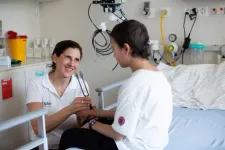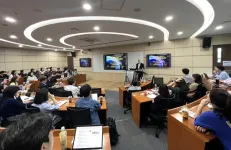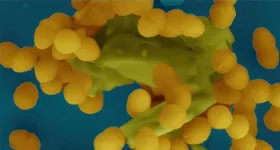Marasco studying inclusive design of contactless fingerprints to mitigate skin tone and gender bias
2024-07-01
(Press-News.org)
Emanuela Marasco, Assistant Professor, Center for Secure Information Systems, received funding for the project: “Identity Verification in Smartphones as Social Intersectionality: Inclusive Design of Contactless Fingerprints to Mitigate Skin Tone and Gender Bias.”
She is developing a contactless biometric mobile security application that can mitigate the vulnerabilities of deep artificial intelligence and optical sensors and allow marginalized identities the same access to data security.
As part of their work, members of the project team will identify the impact of physical vulnerabilities; their analysis will be used to retrain Al models to mitigate these vulnerabilities and to protect users of all backgrounds. As part of their work, the project team members will identify and analyze the impact of physical vulnerabilities, variations in skin tone, and gender-related features. Their findings will inform the retraining of AI models to mitigate these vulnerabilities and ensure protection for users of diverse backgrounds.
Marasco received $50,000 from the Virginia Innovation Partnership Authority for this project. Funding began in June 2024 and will end in late May 2025.
###
ABOUT GEORGE MASON UNIVERSITY
George Mason University is Virginia’s largest public research university. Located near Washington, D.C., Mason enrolls more than 40,000 students from 130 countries and all 50 states. Mason has grown rapidly over the past half-century and is recognized for its innovation and entrepreneurship, remarkable diversity, and commitment to accessibility. In 2023, the university launched Mason Now: Power the Possible, a one-billion-dollar comprehensive campaign to support student success, research, innovation, community, and stewardship. Learn more at gmu.edu.
END
ELSE PRESS RELEASES FROM THIS DATE:
2024-07-01
Cancer treatments often cause nerve damage that can lead to long-lasting symptoms. Medication has proven ineffective in these cases. A sports scientist at the University of Basel, together with an interdisciplinary team from Germany, has now shown that simple exercises can prevent nerve damage.
Cancer therapies have improved over the years. It is no longer just about sheer survival: quality of life after recovery is gaining more importance.
Unfortunately, many cancer medications, from chemotherapy to modern immunotherapies, attack the nerves as well as the tumor cells. Some therapies, such as oxaliplatin or vinca alkaloids, leave 70 to 90 percent of patients complaining of pain, balance ...
2024-07-01
New UCSF study shows that suppressing a protein turns ordinary fat into a calorie burner and may explain why drug trials attempting the feat haven’t been successful.
Researchers at UC San Francisco have figured out how to turn ordinary white fat cells, which store calories, into beige fat cells that burn calories to maintain body temperature.
The discovery could open the door to developing a new class of weight-loss drugs and may explain why clinical trials of related therapies have ...
2024-07-01
Politicians around the world are increasingly mobilizing anti-immigrant sentiment to garner support and votes—a trend that is especially evident as the US presidential election approaches.
While political rhetoric that stereotypes and scapegoats immigrants is well-documented, less attention has been given to the impact of these sentiments on immigrants themselves. In an article published today in the Journal of the American Medical Association (JAMA) and in a recently published book, Migration Stigma (MIT Press), scholars identify “migration ...
2024-07-01
About The Study: The mortality gap between the U.S. and comparison countries widened in the last decade. Each year, nearly 20,000 deaths among youths ages 0 to 19 years would not have occurred had U.S. youths experienced the median mortality rates of 16 comparison countries. More than half of these deaths involved infants, reflecting disproportionately high U.S. infant mortality rates.
Corresponding Author: To contact the corresponding author, Steven H. Woolf, M.D., M.P.H., email steven.woolf@vcuhealth.org.
To access the embargoed study: Visit our For The Media website at this link https://media.jamanetwork.com/
(doi:10.1001/jamapediatrics.2024.1869)
Editor’s ...
2024-07-01
About The Study: Among live-born infants, first-trimester mRNA COVID-19 vaccine exposure was not associated with an increased risk for selected major structural birth defects in this multisite cohort study.
Corresponding Author: To contact the corresponding author, Elyse O. Kharbanda, M.D., M.P.H., email elyse.o.kharbanda@healthpartners.com.
To access the embargoed study: Visit our For The Media website at this link https://media.jamanetwork.com/
(doi:10.1001/jamapediatrics.2024.1917)
Editor’s Note: Please see the article for additional ...
2024-07-01
With Donald Trump and other right-wing politicians increasingly using dehumanizing rhetoric to stigmatize immigrants coming to our nation's borders, doctors and other health officials should prepare for the resulting health consequences.
Such is the message of a “Viewpoint” article co-authored by UC Riverside professor Bruce Link and published Monday, July 1, in the Journal of the American Medical Association.
Link and his co-authors quote Trump as saying, “No, they’re not humans. They’re not humans. They’re ...
2024-07-01
State-of-the-art prosthetic limbs can help people with amputations achieve a natural walking gait, but they don’t give the user full neural control over the limb. Instead, they rely on robotic sensors and controllers that move the limb using predefined gait algorithms.
Using a new type of surgical intervention and neuroprosthetic interface, MIT researchers, in collaboration with colleagues from Brigham and Women’s Hospital, have shown that a natural walking gait is achievable using a prosthetic leg fully driven by the body’s own nervous system. ...
2024-07-01
The earlier a cancer is detected, the better the chances that treatment will be effective. This applies to almost all types of cancer. Another crucial element in successfully treating patients is to individually assess the benefits and risks of individual forms of therapy and to regularly monitor treatment success. To do this, oncologists have a range of methods at their disposal, most notably imaging technology and invasive measures such as tissue biopsies, punctures and endoscopic procedures.
Analyzing gene fragments in the bloodstream
Researchers ...
2024-07-01
Korea University's College of Medicine (Dean Pyun, Sung Bom) hosted the 1st Research Nexus Program in order to enhance international research network cooperation and vitalize global joint research.
This program shares the latest research trends and aims to invigorate international joint research by opening a seminar inviting top global scholars to promote international research performances.
The 1st program held an invitation seminar of Prof. Jeffrey D. Macklis, the "global authority in the field of neurogenesis" (Department of Stem Cell and Regenerative Biology at Harvard University).
Prof. Macklis ...
2024-07-01
A study at Umeå University, Sweden, provides new clues in the understanding of how antibiotic resistance spreads. The study shows how an enzyme breaks down the bacteria's protective outer layer, the cell wall, and thus facilitates the transfer of genes for resistance to antibiotics.
"You could say that we are adding a piece of the puzzle to the understanding of how antibiotic resistance spreads between bacteria," says Ronnie Berntsson, Associate Professor at Umeå University and one of the authors behind the study.
The Umeå researchers have studied Enterococcus faecalis, which is a bacterium that often ...
LAST 30 PRESS RELEASES:
[Press-News.org] Marasco studying inclusive design of contactless fingerprints to mitigate skin tone and gender bias



